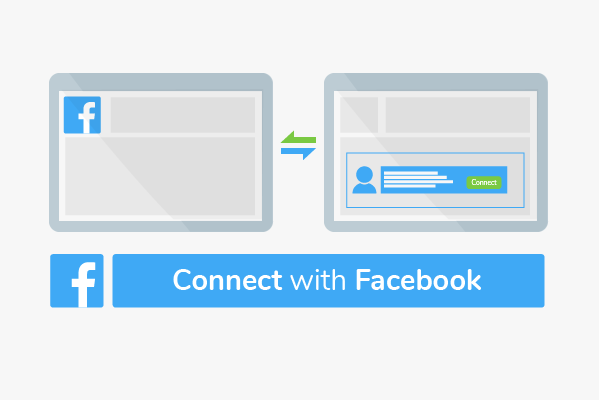Facebook Connect
Facebook Connect is a service that allows Facebook users to log into other websites with their Facebook profile, without having to create separate accounts there.
Operating principle
In order to use Facebook Connect, you must have a Facebook account, which is always protected by a username and a unique password. Facebook collaborates with numerous websites. If you discover the Facebook Connect logo on a website, you can start the login process by clicking on the button. In a pop-up or a new window, you can now enter your Facebook login information. After successful authentication, a connection is established between the Facebook profile and the respective website, on which data can be transmitted. A user can now use the services of the website, without having to set up a separate profile with his/her personal data.
Transmitted data
Exactly what data is transferred is often not fully known fully to users. Facebook always transmits the public data of the profile, which includes among others, the following information:
- Full name
- Saved profile picture
- Age
- Gender
- Friends list
Users have no way to prevent the transmission of such data when using Facebook Connect. The Facebook Connect Login dialog generally displays, what data is being transmitted. However, this list is incomplete, since individual data gets grouped under a generic term. If the user has not bothered to specify in their Facebook settings what data may not be transferred, the operator of the other website may be able to access other data such as the user’s employer, e-mail address or personal preferences.
The transfer of data, however, also occurs in reverse. When logging in with Facebook Connect you get the message that “... would like to post in your name on Facebook.” In practice this means that the provider of the website can post on behalf of the user on their Facebook pinboard. Many operators use this opportunity to inform the user’s friends about their services, for example by posting on the user’s pinboard about his/her activities with regards to the respective service. Moreover, Facebook gains information on these activities through this connection and can thus complement the already existing user data.
Benefits of Facebook Connect
For the user, Facebook Connect has the advantage of saving time. Users won’t have to create a separate account with each service. This eliminates any time involved with registration. Secondly, the connection is useful later, when data changes. If these are modified in the Facebook profile, the associated services are automatically notified.
Businesses who offer their users Facebook Connect as an interface, benefit in that they receive more data from their users, than they could otherwise collect in a regular registration process. Because of the automatic updating of data on the Facebook profile, the service provider will always have current and valid data. Another advantage of Facebook Connect is that the number of registrations can be demonstrably increased by offering the interface.
Risks
Facebook Connect also brings risks. For consumers that means above all, privacy issues. Since users only partially grant their consent to the data transmission, Facebook Connect is not on legally sound ground. Other vulnerabilities arise from the data transmission itself. If unauthorized third parties gain access to the Social Connect provider, the data of all related pages can be viewed.
If a user decides later not to use Facebook Connect, he must then re-register at all websites he used to access via the service or, alternatively, set up another Social Connector link. This should also be seen as a disadvantage.

